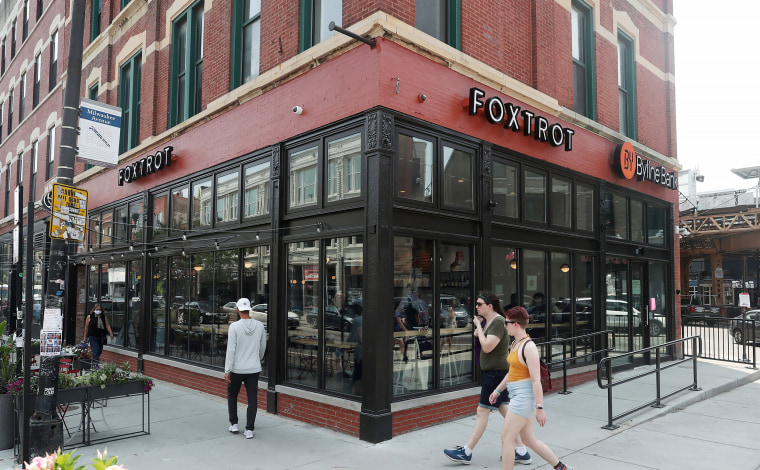Cafe and deli market chains Foxtrot and Dom’s Kitchen & Market have abruptly closed all of their stores in multiple states, leaving both employees and patrons scrambling.
On April 22, the Snaxshot Substack first reported companies operating under Outfox Hospitality would be ceasing all operations. The closure affects 33 Foxtrots and two Dom’s Grocery Stores in Illinois, Texas and the Washington, D.C., area.
Snaxshot reported Outfox would be terminating the employment of corporate employees — who Snaxshot said were being let go without severance — and that Dom’s didn’t make routine purchase orders in the week leading up to this closure.
Now, the Foxtrot website redirects to a written announcement confirming the closure. The letter also appears on its Instagram page.
“It is with a heavy heart that we must inform you of a difficult decision we have had to make. After much consideration and evaluation, we regret to announce that Foxtrot and Dom’s Kitchen & Market will be closing their doors starting on April 23, 2024,” the announcement reads.
Outfox goes on to write that it “explored many avenues to continue the business but found no viable option despite good faith and exhaustive efforts.”
“We understand that this news may come as a shock, and we apologize for any inconvenience it may cause,” the company wrote.
In late 2023, Foxtrot and Dom’s Kitchen & Market announced a merger and formed the entity called Outfox Hospitality. In recent years, the business made headlines for multiple management shakeups including new CEOs as well as layoffs.
Representatives for Outfox did not immediately respond to TODAY.com’s request for comment.
People on social media have been sharing their experiences amid the sudden closures, including someone who identified as a Chicago-area employee who detailed her last day in a TikTok, writing, “Just found out we’re losing our jobs!!”
“So we just found out our store is closing today at 12,” TikTok user @sadkiwigirl says in her now-viral video, before asking a colleague what time it was.
“10:14,” they answer.
The TikToker continues, “And by closing I mean the entire chain is shutting down.”
After expressing confusion as to when — or if — she should take a break, making her last latte and wondering what she should tell customers eating and working on their laptops in the cafeteria, the video cuts to an empty store.
“Kicked out all the customers !! :,(” the on-screen caption reads.
Elsewhere on the web, while some X users and Redditors spoke of the products they enjoyed getting, others focused on their disappointment over locked doors at several shuttered locations. Folks also remarked on big crowds gathering at closing stores, some of which were seen handing out free wine.
On April 24, a day after the closure and resulting layoffs, a class action lawsuit was filed on behalf of employees. According to the legal filing — of which a former employee is the lead plaintiff — employees were allegedly “terminated immediately without any prior notice” on Tuesday morning.
Syed H. Hussain, an attorney for the class action, tells TODAY.com his team is working to get former employees compensation under the Worker Adjustment and Retraining Notification (WARN) Act.
“The termination of hundreds of employees across the country with no notice is abhorrent and should be made an example of,” Hussain says. “Hundreds in Chicago alone are now without work. Employees should never be afraid to stand up for their rights afforded to them.”
“I think that there’s going to be a question as to whether or not this company failed to meet its obligations under the state and federal WARN acts,” Christopher J. Keating, New Jersey-based lawyer, tells TODAY.com. He owns Keating Law Firm, which often represents employees in labor based disputes.

Keating says employment lawyers and the workers who were terminated will be looking to see if Outfox company pays out all wages that have been earned by eployees up until the time of closure.
“Under state and federal laws, including the Fair Labor Standards Act, they will owe every employee every penny they have earned for hours worked, and those employees must be paid on time and in full,” he continues.
Additionally, the WARN Act is a federal law requiring employers with at least 100 employees to give them a minimum of 60 days notice in writing before closing or a mass layoff. Some states have their own versions of the legislation offering stronger protections.
Outfox employed nearly 1,000 people companywide, with nearly 100 in Illinois, according to Eater Chicago. Many employees say they were given two hours (or less) notice in many cases.
Since Illinois’ WARN Act applies to companies with only 75 or more employees, Outfox’s layoffs would likely apply, although no closure notices for the company appear on Illinois’ WARN report.
Sarah M. Brown, clinical assistant professor of law at Northwestern Pritzker Law, tells TODAY.com while it’s possible Outfox violated the WARN Act, it’s also possible one of its exceptions will apply.
“Generally speaking, a company may be exempt from giving the required notice if it is considered a ‘faltering company,’” Brown says. She notes this exemption means the business would have been actively seeking capital and had a good-faith belief that notifying its employees would hurt its ability to obtain the capital, which may prevent any layoffs.
Brown also says there is an exception for “unforeseeable business circumstances.”
“On the other hand,” she continues, “when a company knows it might experience a mass layoff, it cannot avoid its notice requirements by filing for bankruptcy.”
“The WARN Act is only part of the analysis,” Keating says. “Not only are we concerned about the employees being unemployed moving forward, but the law also requires that they be made whole and paid every penny for the time that they’ve already worked during this pay cycle.”

